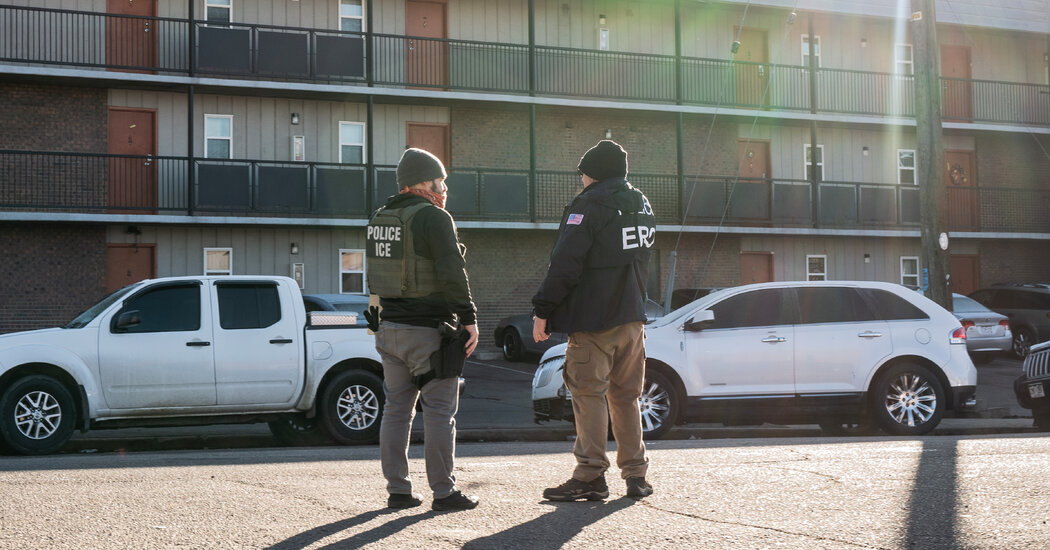The Trump administration has granted itself the authority to summarily deport Venezuelan migrants accused of being members of a violent street gang on the basis of little more than whether they have tattoos or have worn clothing associated with the criminal organization, new court papers show.
The papers suggest that the administration has set a low bar for seeking the removal of migrants whom officials have described as belonging to the street gang, Tren de Aragua. This month, the White House ordered the deportation of more than 100 people suspected of being members of the gang under a powerful wartime statute, the Alien Enemies Act, and have denied them any due process to challenge the allegations against them.
In the court papers, submitted over the weekend, lawyers for the Venezuelan migrants produced a government document, titled “Alien Enemy Validation Guide,” that laid out a series of criteria administration officials are required to meet to designate the men as members of Tren de Aragua.
The document established a scoring system for deciding whether the migrants were in fact members of the gang, which is often referred to as TdA, asserting that eight points were required for any individual to be identified as a member.
According to the document, any migrant who admitted to being a member of the gang was assigned 10 points, meaning that they were automatically deemed to belong to the group and were subject to immediate deportation under the Alien Enemies Act.
But the document also asserts that officials can assign four points to a migrant simply for having “tattoos denoting membership/loyalty to TDA” and another four points if law enforcement agents decide that the person in question “displays insignia, logos, notations, drawings, or dress known to indicate allegiance to TDA.”
Moreover, the document says that officials can identify members of Tren de Aragua merely if they are “dressed in high-end urban street wear” — especially basketball jerseys from the Chicago Bulls or its former star player Michael Jordan.
Lawyers for the Venezuelan migrants have repeatedly claimed that officials have used the existence of tattoos to falsely accuse several people of belonging to Tren de Aragua and deporting them to a notoriously brutal prison in El Salvador.
In one instance, a man who was deported was accused of having a crown tattoo that officials said proved his membership, but his lawyers claimed that the tattoo was in honor of the man’s favorite soccer team, Real Madrid. Another migrant got a similar crown tattoo, the lawyers said, to commemorate the death of his grandmother.
The validation guide, with its eight-point scoring system, was part of a larger filing by the lawyers arguing that the Trump administration was acting unlawfully by denying the migrants any opportunity to challenge accusations that they belonged to Tren de Aragua in the first place.
The lawyers have also challenged the administration’s broader use of the Alien Enemies Act, saying that officials have misused the law, which is supposed to be invoked only during times of a declared war or during an invasion by a foreign nation.
Two weeks ago, Judge James E. Boasberg of the Federal District Court in Washington temporarily barred the White House from using the law to deport any of the Venezuelans. The Trump administration has asked the Supreme Court to freeze the judge’s order as it considers its underlying merits.
According to the court papers filed this weekend, one of the men accused of belonging to Tren de Aragua because of his tattoos was Andry Jose Hernandez Romero, a professional makeup artist who has often worked at beauty pageants and who identifies as gay.
Lawyers for Mr. Hernandez Romero said that his tattoos included one showing a crown next to the word “Mom” and another of a crown next to the word “Dad.”
“There is no evidence to believe that he is affiliated in any way with Tren de Aragua and Andry has consistently refuted those claims,” his lawyers wrote. “He fled Venezuela due to persecution for his political opinion and his sexual orientation and his tattoos have an obvious explanation that has nothing to do with a gang.”
